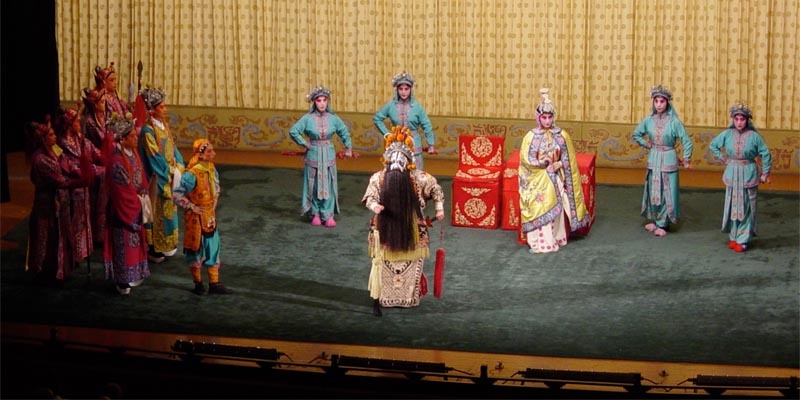|
Huangmei Opera
Huangmei Opera or Huangmei tone ( or , pinyin: or ) is a form of Chinese opera originating from Anqing, Anhui province, as a form of rural folk song and dance. It is also referred to as Anhui Opera. It has been in existence for the last 200 years and possibly longer. Huangmei opera is one of the most famous and mainstream opera in China (others are Beijing opera, Yue opera, Ping opera and Yu opera), and is a class of the typical Anhui opera. The original Huangmei opera was sung by women in Anqing areas when they were picking tea, and the opera was called the ''Picking Tea Song''. In the late Qing dynasty, the songs were popular in Anhui Huaining County adjacent regions, combined with the local folk art, Anqing dialect with singing and chants, and gradually developed into a newborn's operas. The music is performed with a pitch that hits high and stays high for the duration of the song. It is unique in the sense that it does not sound like the typical rhythmic Chinese opera. In th ... [...More Info...] [...Related Items...] OR: [Wikipedia] [Google] [Baidu] |
Ivy Ling Po
Huang Yuet-chu (born November 16, 1939), known professionally by her stage name Ivy Ling Po, is a retired actress and Chinese opera singer from Hong Kong. She gained widespread fame during the 1960s for her roles in several popular Huangmei opera films; most notably ''The Love Eterne'' (1963). This role was lauded as an inspiring performance in Asian culture, solidifying her status as a cultural icon. Ling Po initially acted in Amoy Hokkien's films under the stage name Xiaojuan (), then in Cantonese films under Shen Yan (), before joining the Shaw Brothers Studio to act in Mandarin films as (Ivy) Ling Po (). Early life Huang Yu-Chun was born on November 16, 1939, in Shantou, Guangdong. As a child, she was sold to a family in Xiamen. She was given the name Jun Haitang () and worked as a domestic maid. After reaching preadolescence, her adoptive mother forced her to enter the movie industry in Hong Kong. Ling Po claimed she did not have a childhood and was often scolded ... [...More Info...] [...Related Items...] OR: [Wikipedia] [Google] [Baidu] |
Peking Opera
Peking opera, or Beijing opera (), is the most dominant form of Chinese opera, which combines instrumental music, vocal performance, mime, martial arts, dance and acrobatics. It arose in Beijing in the mid-Qing dynasty (1644–1912) and became fully developed and recognized by the mid-19th century. The form was extremely popular in the Qing court and has come to be regarded as one of the cultural treasures of China. Major performance troupes are based in Beijing, Tianjin and Shanghai. The art form is also preserved in Taiwan, where it is also known as (). It has also spread to other regions such as the United States and Japan. Peking opera features four main role types, ''Sheng role, sheng'' (gentlemen), ''dan role, dan'' (women), ''jing role, jing'' (rough men), and ''chou role, chou'' (clowns). Performing troupes often have several of each variety, as well as numerous secondary and tertiary performers. With their elaborate and colorful costumes, performers are the only focal ... [...More Info...] [...Related Items...] OR: [Wikipedia] [Google] [Baidu] |
Chou Role
The ''Chou'' is the clown role in Chinese opera. The usually plays secondary roles in a troupe. Peking opera Most studies of Peking opera classify the as a minor role. roles can be divided into (文丑), civilian roles such as merchants and jailers, and (武丑), minor military roles. The is one of the most demanding in Peking opera, because of its combination of comic acting, acrobatics, and a strong voice. characters are generally amusing and likable, if a bit foolish. Their costumes range from simple for characters of lower status to elaborate, perhaps overly so, for high status characters. characters wear special face paint, called , that differs from that of characters. The defining characteristic of this type of face paint is a small patch of white chalk around the nose. This can represent either a mean and secretive nature or a quick wit. Originally, there were five roles in Beijing opera, but the last role "Mo" became a part of "Chou". Beneath the whimsical perso ... [...More Info...] [...Related Items...] OR: [Wikipedia] [Google] [Baidu] |
Xiaosheng
The ''xiaosheng'' () is a male role type in Chinese opera and a subtype of the ''sheng role, sheng''. Most ''xiaosheng'' characters are young Confucian scholars or, less often, young warriors. Unlike ''laosheng'' actors, ''xiaosheng'' actors do not wear a beard. However, not all beardless roles are necessarily ''xiaosheng'', for example eunuchs (''huanguan'') can be played by ''xiaosheng'', ''chou role, chou'', ''jing role, jing'', or ''longtao'' actors (extras). Subtypes Confucian scholars and officials The ''jinsheng'' or ''jinzisheng'' ( or , "cloth ''sheng''"), sometimes also known as the ''shanzisheng'' (, "fan ''sheng''"), is a young Confucian scholar who has yet to pass the imperial examination. He wears the ''rujin'' ("Confucian cloth") on his head and often holds a hand fan. This role is often featured in romantic dramas and requires the ability to play with the fan to exude an air of elegance and class. A slightly different version is the ''qiongsheng'' (, "poor ''sheng ... [...More Info...] [...Related Items...] OR: [Wikipedia] [Google] [Baidu] |
Cantopop
Cantopop (a contraction of "Cantonese pop music") is a genre of pop music sung in Cantonese. Cantopop is also used to refer to the cultural context of its production and consumption. The genre began in the 1970s and became associated with Hong Kong popular music from the middle of the decade. Cantopop then reached its height of popularity in the 1980s and 1990s before slowly declining in the 2000s and shrinking in the 2010s. The term "Cantopop" itself was coined in 1978 after "Cantorock", a term first used in 1974. In the 1980s, Cantopop reached its highest glory with fanbase and concerts all over the world, especially in Macau, Mainland China, Taiwan, Singapore, Malaysia, South Korea, and Japan. This was even more obvious with the influx of songs from Hong Kong movies during the time. Besides Western pop music, Cantopop is also influenced by other international genres, including jazz, rock and roll, R&B, disco, electronic, ballad and others. Cantopop songs are almost inva ... [...More Info...] [...Related Items...] OR: [Wikipedia] [Google] [Baidu] |
Tsin Ting
Jing Ting (; 1934 – 20 October 2022) was a Chinese singer and dubbing artist, sometimes known as the Marni Nixon of Hong Kong cinema. Biography Tsin Ting was born in Sichuan, China. She arrived in Hong Kong in 1949 with her brother after China came under communist rule. Left to fend for herself after her brother left for Taiwan, she sang in nightclubs to earn some money. In 1953, she recorded a Cantonese song, "One Day When We Were Young", on one side of a 78 but refused to do the other after finding her command of the language not up to par. In 1954, she auditioned for EMI Pathé when they were recruiting new talent but was told by composer Yao Min who auditioned her that her vocals lacked power and energy. She was offered instead, a part in the chorus. In 1956, she was signed on as a solo artist after Miriam Wang, the chief executive, took notice of her. Her first record was two songs from the Shaw & Sons film ''Narcissus'', where she dubbed for actress Shih Ying. Her self ... [...More Info...] [...Related Items...] OR: [Wikipedia] [Google] [Baidu] |
Betty Loh Ti
Betty Loh Ti (July 24, 1937 – December 27, 1968), known as Loh Tih for short, was a Hong Kong actress originally from Shanghai. Known as the "Classic Beauty", she was one of the most celebrated actresses of Hong Kong cinema. She is most famous for her roles in the 1960 film ''The Enchanting Shadow'', for which she was called "China's most beautiful actress" by the jury of the 1960 Cannes Film Festival, and ''The Love Eterne'', which earned her the Golden Horse Award for Best Leading Actress in 1963. She died from barbiturate overdose at the age of 31. Early life Betty Loh Ti was born as Hsi Chung-i on 24 July 1937 into a prominent family from Pudong, the owner of the Xi Fu Ji () Factory in Shanghai. She was born in the midst of the Battle of Shanghai, one of the bloodiest battles of the Second Sino-Japanese War, during which her father was killed by Japanese bombing before she was born. She was the youngest of six siblings; her elder brother (born Hsi Chungchien) would grow ... [...More Info...] [...Related Items...] OR: [Wikipedia] [Google] [Baidu] |
Wuxia
( , literally "martial arts and chivalry") is a genre of Chinese literature, Chinese fiction concerning the adventures of martial artists in ancient China. Although is traditionally a form of historical fantasy literature, its popularity has caused it to be adapted for such diverse art forms as Chinese opera, manhua, television dramas, films, and video games. It forms part of popular culture in many Chinese-speaking communities around the world. According to Hong Kong film director, producer, and movie writer Ronny Yu, wuxia movies are not to be confused with Martial arts film, martial arts movies. The word "" is a compound composed of the elements (, literally "martial", "military", or "armed") and (, literally "chivalrous", "vigilante" or "hero"). A martial artist who follows the code of is often referred to as a (, literally "follower of ") or (, literally "wandering "). In some translations, the martial artist is referred to as a () or (), either of which can be i ... [...More Info...] [...Related Items...] OR: [Wikipedia] [Google] [Baidu] |


